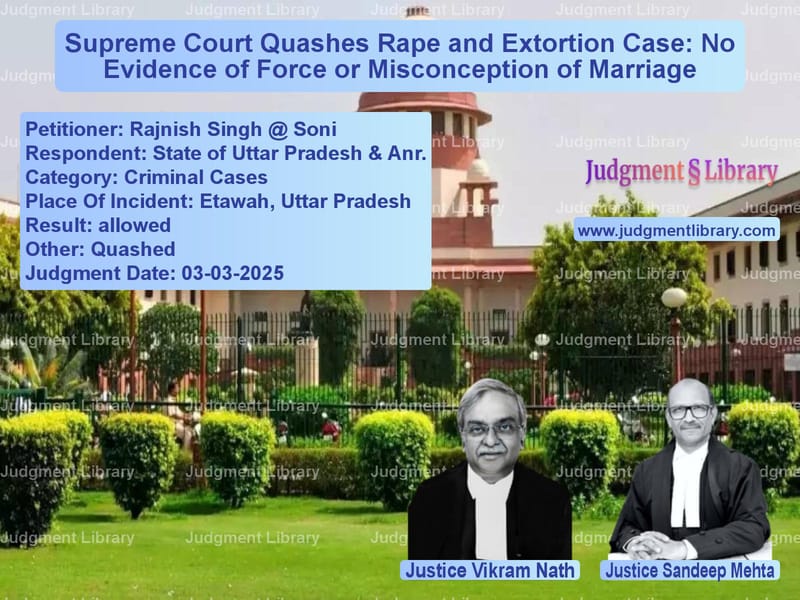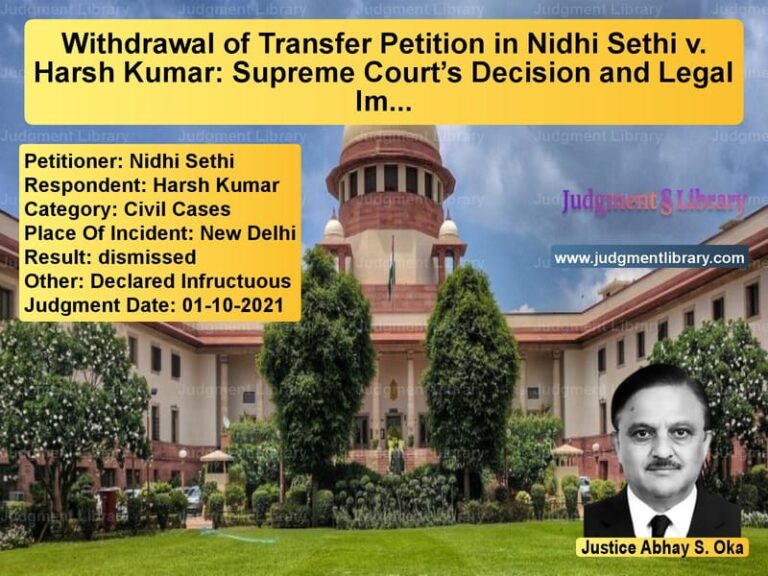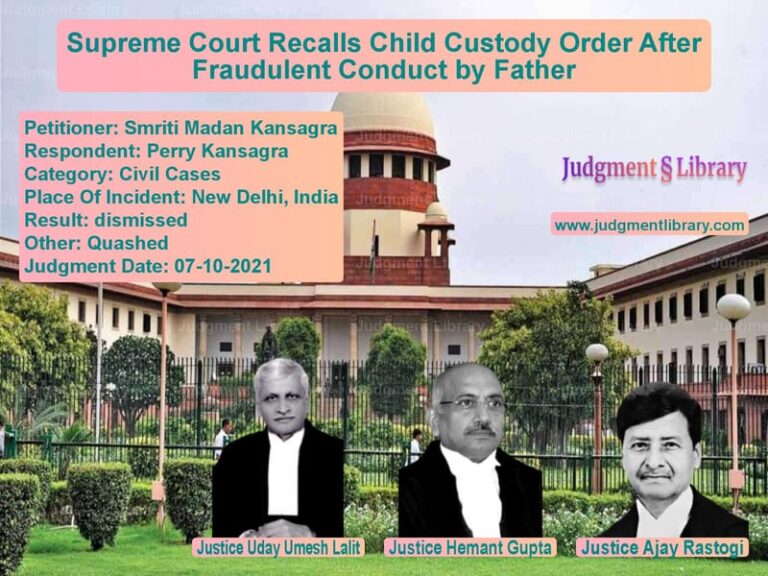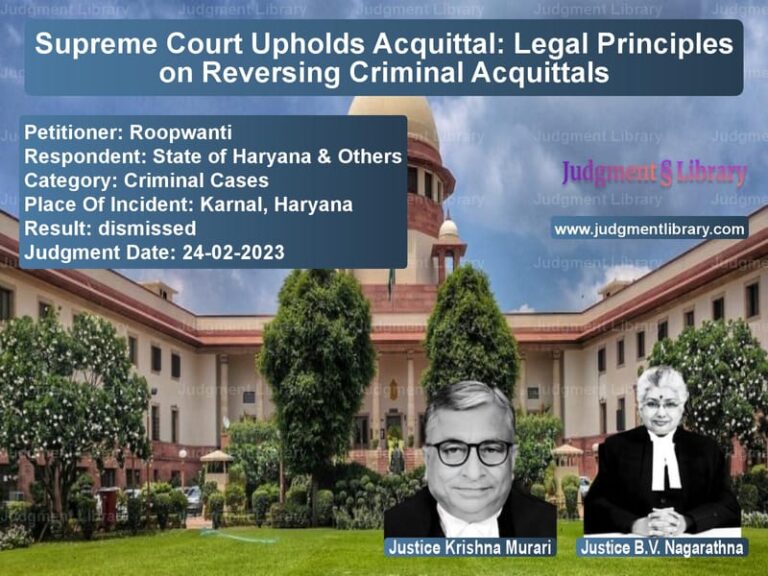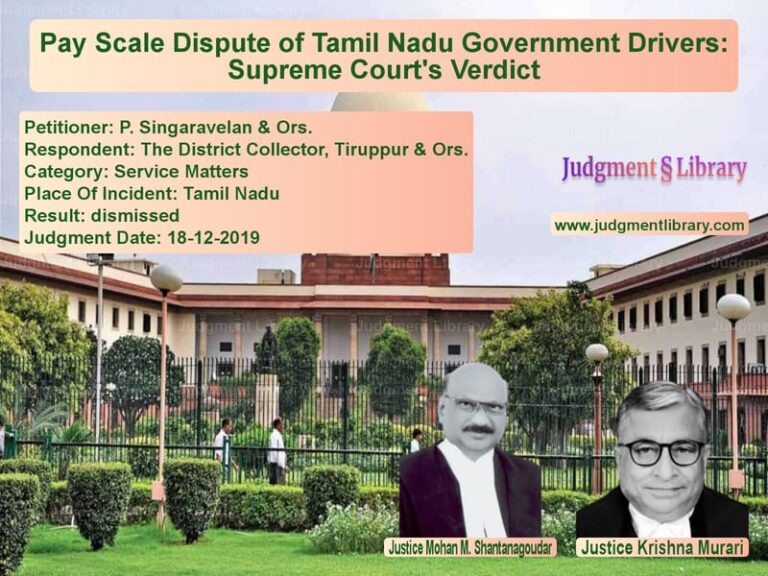Supreme Court Quashes Rape and Extortion Case: No Evidence of Force or Misconception of Marriage
The Supreme Court of India, in a landmark ruling, has quashed the criminal proceedings against the appellant, Rajnish Singh @ Soni, in the case of Rajnish Singh v. State of Uttar Pradesh. The judgment underscores the distinction between a consensual relationship and allegations of rape based on a purported false promise of marriage. It also clarifies the evidentiary standards required to prove extortion and criminal intimidation under the Indian Penal Code (IPC).
Background of the Case
The case originated from an FIR lodged by the complainant, Ms. A, on July 5, 2022, at Bakewar Police Station, District Etawah, Uttar Pradesh. The complainant accused the appellant of committing offenses under Sections 376 (Rape), 384 (Extortion), 323 (Voluntarily Causing Hurt), 504 (Intentional Insult), and 506 (Criminal Intimidation) of the IPC.
Key Allegations
- The complainant alleged that in 2006, the appellant entered her house at night and forcibly established sexual relations with her.
- She claimed that the appellant later apologized and assured her of marriage, which led her to remain silent.
- The accused allegedly drugged her in 2009, raped her while she was unconscious, and recorded explicit videos.
- He later used these videos to blackmail her, forcing her to continue the relationship for over 15 years.
- In 2021, the appellant got engaged to another woman, prompting the complainant to disclose the incidents to her family.
- She also accused him of extorting ₹94,000 from her in 2011 under the threat of making their intimate videos public.
Trial Court and High Court Proceedings
Following the FIR, the police submitted a chargesheet against the appellant under Sections 376, 384, 323, 504, and 506 of the IPC. The Additional Chief Judicial Magistrate took cognizance and issued summons to the appellant. The appellant moved the Allahabad High Court under Section 482 CrPC, seeking quashing of the FIR and subsequent proceedings.
However, the High Court dismissed his petition on April 24, 2023, ruling that the allegations were serious and should be examined at trial. The appellant then approached the Supreme Court.
Arguments Before the Supreme Court
Petitioner’s (Appellant’s) Arguments
- The complainant was a well-educated, independent woman who willingly engaged in a relationship with him for over 16 years.
- All sexual encounters were consensual and not induced by deception, coercion, or a false promise of marriage.
- The complainant herself admitted to portraying the appellant as her husband in multiple documents.
- The long delay in filing the FIR (from 2006 to 2022) raised serious doubts about the credibility of the allegations.
- The claim of extortion in 2011 lacked any documentary proof.
Respondent’s (State of Uttar Pradesh’s) Arguments
- The appellant misled the complainant into believing he would marry her, which vitiated her consent.
- He used blackmail and threats to coerce her into continuing the relationship.
- He committed extortion by forcefully taking money from her.
- The complainant remained silent for years due to fear and societal pressure.
Supreme Court’s Analysis
1. Consent and False Promise of Marriage
The Court reiterated the legal principle that a false promise of marriage can only vitiate consent if it is established that the accused never intended to marry the complainant from the outset.
“There is a distinction between rape and consensual sex. To establish rape under a false promise of marriage, the prosecution must prove that the accused never intended to fulfill the promise. Mere failure to marry does not amount to rape.”
Given that the relationship lasted 16 years without any formal complaint, the Court found it improbable that the complainant’s consent was obtained through deceit.
2. Delay in Filing the FIR
The Court expressed serious concerns over the delay of 16 years in lodging the complaint:
“The complainant, an educated and independent woman, had ample opportunity to report the alleged offenses earlier. Her prolonged silence raises serious doubts about the veracity of her allegations.”
3. Allegations of Extortion
The Court found that the extortion charge lacked substantial evidence:
“The prosecution failed to produce any documentary proof of the alleged ₹94,000 transaction. Mere allegations without corroborative evidence cannot sustain a charge of extortion.”
4. Nature of Relationship
The Court noted that the complainant voluntarily met the appellant multiple times over the years, often traveling to his location. It observed:
“The relationship between the appellant and the complainant was one of mutual intimacy and cannot be termed as forced or deceitful.”
5. Precedents Relied Upon
- Deepak Gulati v. State of Haryana (2013): A promise of marriage made in good faith, but later not fulfilled, does not constitute rape.
- Mahesh Damu Khare v. State of Maharashtra (2024): Prolonged consensual relations negate the claim of coercion.
- Shivashankar v. State of Karnataka (2019): A consensual relationship spanning years cannot be later termed as rape due to a failed marriage promise.
Final Judgment
The Supreme Court allowed the appeal, quashing the FIR and all subsequent proceedings. It held:
“The allegations are vague, unsupported by evidence, and belatedly made after 16 years of consensual intimacy. Allowing prosecution in such cases would set a dangerous precedent.”
Key Takeaways from the Judgment
- False Promise of Marriage Requires Clear Intent: The burden is on the prosecution to prove that the accused never intended to marry from the beginning.
- Delay in Reporting Weakens Credibility: A significant delay in lodging an FIR without justification can lead to dismissal of the case.
- Consensual Relationships Cannot Be Criminalized: Engaging in a relationship willingly over several years cannot later be rebranded as coercion.
- Extortion Claims Must Be Substantiated: Mere allegations of forced financial transactions require documentary proof.
Conclusion
The Supreme Court’s ruling in Rajnish Singh v. State of Uttar Pradesh is a landmark decision reinforcing the principle that consensual relationships cannot be later turned into criminal cases based on failed marriage promises. It sets a clear precedent that courts must scrutinize such allegations carefully and that long-standing intimate relationships require clear evidence of deception to sustain criminal charges. The decision protects individuals from wrongful prosecution while maintaining the sanctity of genuine cases of sexual offenses.
Petitioner Name: Rajnish Singh @ Soni.Respondent Name: State of Uttar Pradesh & Anr..Judgment By: Justice Vikram Nath, Justice Sandeep Mehta.Place Of Incident: Etawah, Uttar Pradesh.Judgment Date: 03-03-2025.
Don’t miss out on the full details! Download the complete judgment in PDF format below and gain valuable insights instantly!
Download Judgment: rajnish-singh-@-soni-vs-state-of-uttar-prade-supreme-court-of-india-judgment-dated-03-03-2025.pdf
Directly Download Judgment: Directly download this Judgment
See all petitions in Bail and Anticipatory Bail
See all petitions in Fraud and Forgery
See all petitions in Extortion and Blackmail
See all petitions in Judgment by Vikram Nath
See all petitions in Judgment by Sandeep Mehta
See all petitions in allowed
See all petitions in Quashed
See all petitions in supreme court of India judgments March 2025
See all petitions in 2025 judgments
See all posts in Criminal Cases Category
See all allowed petitions in Criminal Cases Category
See all Dismissed petitions in Criminal Cases Category
See all partially allowed petitions in Criminal Cases Category

